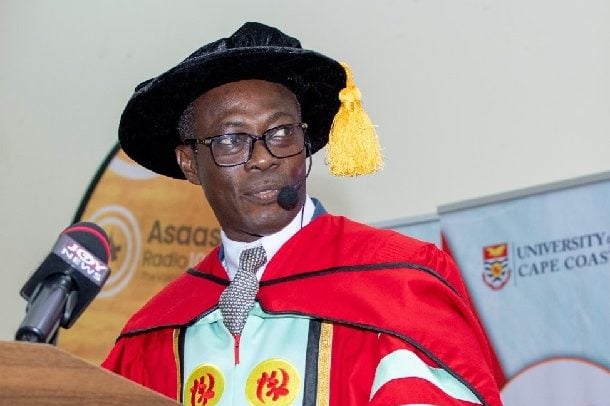The Ghana Tertiary Education Commission (GTEC) has intervened in the ongoing controversy surrounding the tenure of Professor Johnson Nyarko Boampong as Vice-Chancellor of the University of Cape Coast (UCC), directing him to step down from the position. The core issue revolves around Prof. Boampong’s age, which has exceeded the mandatory retirement age of 60 for public officers as stipulated in Article 199(1) of the 1992 Constitution. GTEC’s directive, communicated through a letter dated September 19, 2025, asserts that the Vice-Chancellor’s office, established under the University of Cape Coast Act, 1992 (PNDCL 278), falls squarely within the definition of a public office. Consequently, anyone holding this position is subject to the constitutional requirement of compulsory retirement upon reaching the age of 60. The Commission’s action aims to uphold the constitutional provision and ensure adherence to established retirement regulations within public institutions.
The GTEC letter further emphasizes that Prof. Boampong’s continued occupation of the Vice-Chancellor’s office violates Article 199(1) of the Constitution. The Commission also pointed to the University of Cape Coast Statutes (2016), which outline the tenure of a Vice-Chancellor as an initial four-year term, renewable for a further three years, with the crucial caveat that the individual must not have reached the compulsory retirement age. This reinforces the argument that Prof. Boampong’s continued tenure is not permissible under the existing regulations governing the university. The Commission’s reference to both the Constitution and the university statutes provides a strong legal basis for its directive.
In light of the directive for Prof. Boampong to step down, GTEC has appointed Professor Denis Worlanyo Aheto, the Pro-Vice-Chancellor, as the acting Vice-Chancellor. This interim arrangement aims to ensure continuity in the university’s leadership and administrative functions while the substantive issue of the Vice-Chancellor’s position is resolved. The appointment of an acting Vice-Chancellor underscores GTEC’s commitment to maintaining stability and effective governance within the university. It also suggests that the commission anticipates a potentially protracted process to resolve the matter definitively.
Adding another layer of complexity to the situation, the GTEC acknowledges the ongoing legal proceedings related to this matter at the Cape Coast High Court. In deference to the judicial process, the Commission has instructed the UCC Governing Council to suspend the appointment of a substantive Vice-Chancellor until the court delivers its ruling. This demonstrates GTEC’s respect for the judicial process and its willingness to abide by the court’s decision. It also suggests that the legal challenge to Prof. Boampong’s continued tenure is a significant factor in the ongoing dispute.
The GTEC’s intervention represents a significant development in the unfolding saga surrounding the Vice-Chancellor’s position at UCC. The Commission’s directive, based on constitutional provisions and university statutes, has created a period of uncertainty and transition in the university’s leadership. The interim appointment of an acting Vice-Chancellor aims to bridge the gap while awaiting the court’s decision, which will ultimately determine the future leadership of the university. The situation highlights the importance of adhering to established rules and regulations regarding retirement age in public institutions, particularly within the academic sphere.
This case serves as a pivotal point in the governance of higher education institutions in Ghana. The outcome will likely set a precedent for future interpretations of retirement regulations within the context of university leadership. The court’s decision will not only resolve the immediate issue at UCC but also potentially clarify the application of the Constitution and university statutes in similar scenarios at other institutions. This, in turn, could influence the development of more precise and unambiguous regulations regarding retirement age and tenure for university leadership positions across the country. The implications extend beyond the individual case and hold broader significance for upholding the principles of good governance and adherence to constitutional mandates within the higher education sector.














